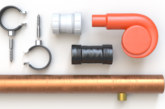
David Osborne, Managing Director of Roman, explains the change in UK legislation from CE to UKCA Marking which comes into force on 1st January 2021 and details the considerations for manufacturers, merchant resellers and customers alike.
As the UK leaves the EU at the end of December, there is a very important change in mandatory product marking to follow with the new UKCA (UK Conformity Assessed) Mark being phased in from 1st January 2021 to replace the CE Mark in the UK (this includes England, Wales and Scotland).
This marks a critical change in legislation, however a transition period will run from the start of the New Year to ease the changeover as all products placed on the market in Great Britain with the CE Mark will remain valid until 1st January 2022. Similarly, the UKCA Marking does not apply to existing stock — i.e. products manufactured and ready to place on the market before 1st January 2021 — with the CE Marking on such products still valid.
The UKCA Marking is invalid for products placed on the EU market which require CE Marking, and the same applies for Northern Ireland market which will require the CE Marking or new UK (NI) Marking. All products placed in Great Britain can have both the CE and UKCA Marking affiliated to them, providing they fulfil the associated requirements.
It is the responsibility of manufacturers to ensure their products conform to the standard, but the final reseller — for example, builders’ merchants or plumbers — also has a legal responsibility to ensure the products they stock, or are specifying, conform to the standard.
It must be stressed that the CE/UKCA Marking is a mandatory legal requirement with enforcement. Two of the common misconceptions are that it is something that the manufacturers would resolve if there was a problem; and secondly saying that you conform is one thing, but proving you conform is actually what CE/UKCA Marking is all about.
There are still many non-compliant products out there and there are huge consequences for the seller of the non-compliant product. Indeed, the internet and the lower end of the market have been prospering by openly selling a wide array of non-compliant products.
Large fines and imprisonment can be the ultimate result for knowingly selling non-conforming products, so it is strongly urged that buyers ask the right questions around CE/UKCA marking to all their suppliers.
For further details on the transition from the CE Mark to the new UKCA Mark, click here: https://www.gov.uk/guidance/using-the-ukca-mark-from-1-january-2021
At Roman, every product is digitally photographed before final packaging and carries an individual product code for complete traceability. As a responsible British manufacturer of showering products, it carries out three main tests to ensure all showering products conform to the BS EN14428 Standard:
- A water test to ensure there is no leakage. This is tested with a shower valve set at the stated pressure in the enclosure being tested for a set amount of time.
- A cycle rig to test the opening and closing of the shower enclosure door. The cycle rig will open and close the door 20,000 times, which replicates a product lifecycle.
- A swing ball test, which uses different weighted balls of up to 50kg, to swing into the shower enclosure, wetroom panel or bath screen. This test is undertaken to imitate if someone were to fall into the product — to make sure the structure is strong enough to withstand the impact (testing of glass is a pre-requisite at point of toughening).
More information on Roman’s range of products and support services for merchants can be found via https://roman-showers.com/about-us/
A version of this article originally appeared in PBM’s December edition. Please click here to read the full issue online.









